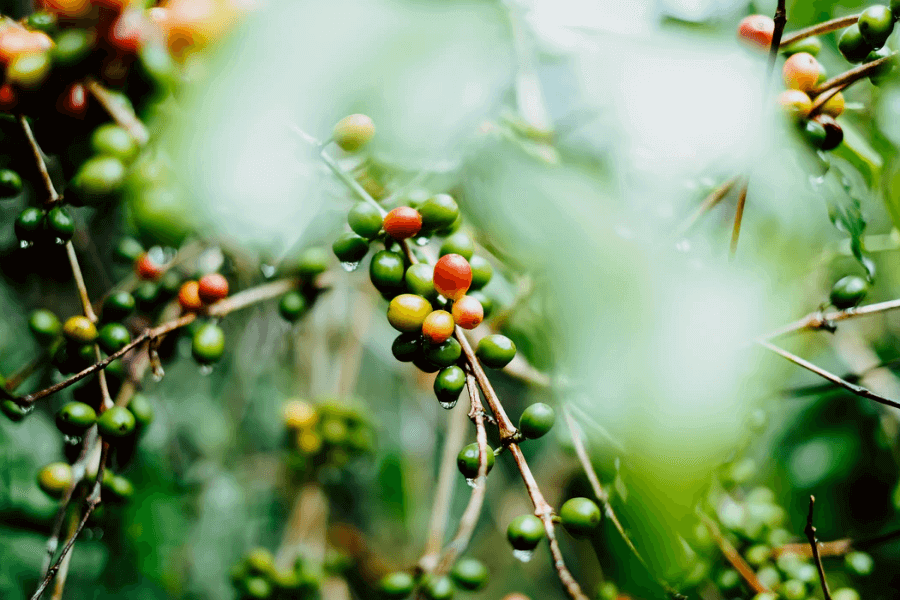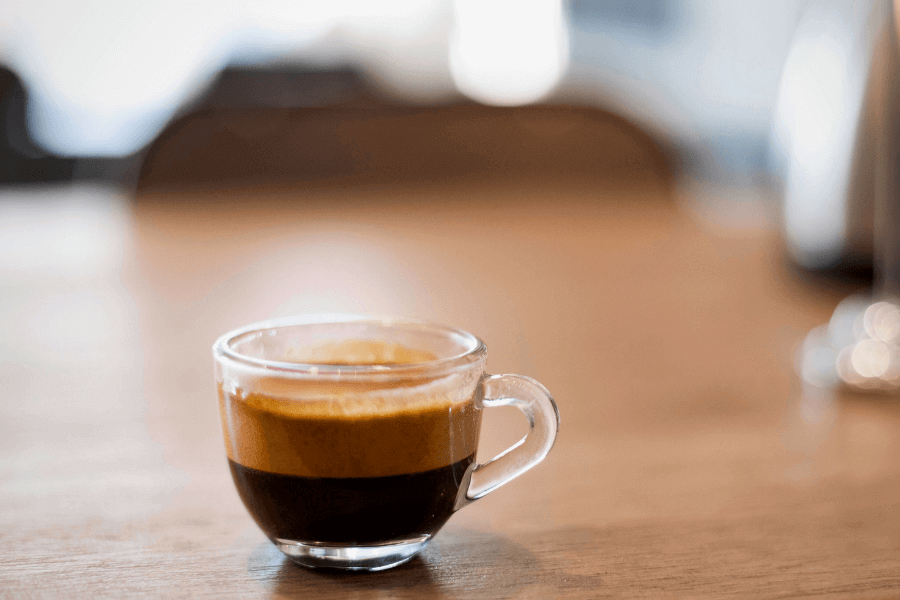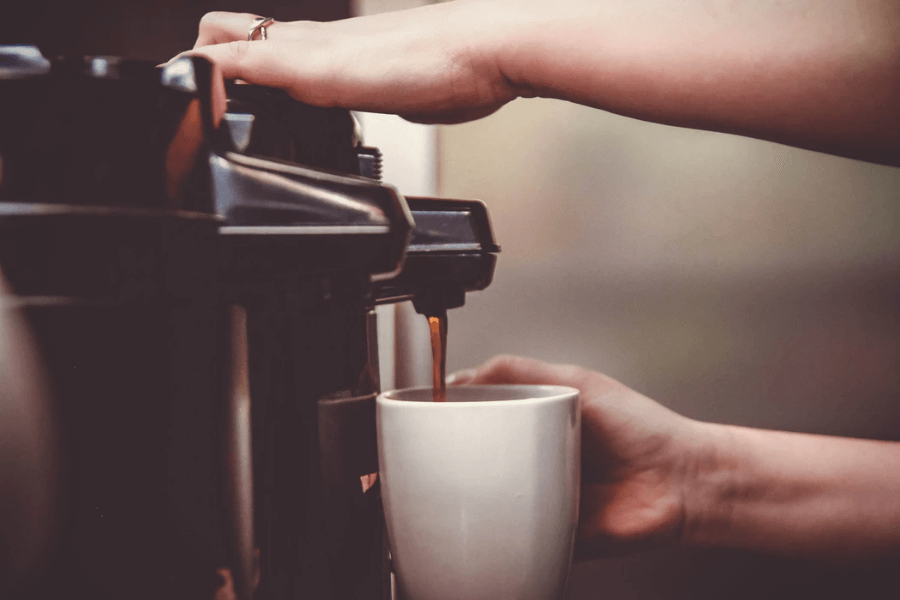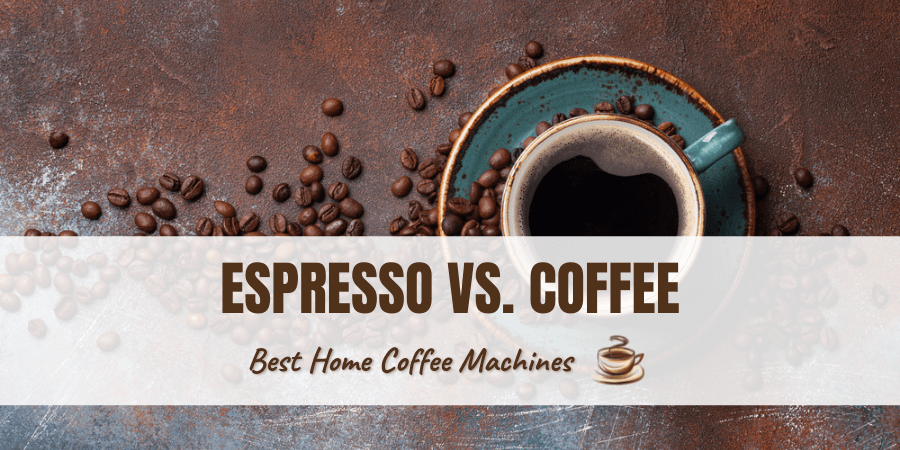What’s the Difference Between Espresso and Coffee?
When I was a teen I claimed that coffee was life yet knew nothing about it, I thought espresso was just a fancy way to say “filtered.” I also believed that Americano was made from beans specifically harvested in the USA.
So that tells you all you need to know about how smart I was back then.
Now that you’ve stopped laughing at me (I don’t blame you) let’s continue.
Everyone knows that espresso is distinct, but what makes it so special? Is espresso really stronger than coffee, and if so, how?
Here, we take an in-depth look at the difference between espresso and coffee, so you’ll know exactly what you’re ordering the next time you visit a cafe.
Here’s what we’ll cover:
So, What Exactly Is Coffee?
Depending on who you ask, coffee is either a plant or a magical elixir gifted to us from a deity or deities. Both of these answers are correct, and those who say otherwise are not people you should keep in your life.
Jokes aside. To put it in layman’s terms, coffee as we know it is a drink made from coffee beans, which are the seeds of the coffee cherry, which, in turn, is the fruit of the coffee plant.
For interest’s sake, there are over 120 species within the coffee genus, but generally, only four types of coffee beans are prominent:
- Arabica (Coffea arabica)
- Excelsa (Coffea liberica var. dewevrei or more commonly, Coffea excelsa)
- Liberica (Coffea liberica)
- Robusta (Coffea canephora)
The coffee you enjoy each day today is most likely the product of one of these four beans. If you’d like to get into the botany of it, you may want to take a peek at my article on how coffee is made, but for now, the details aren’t important.
What matters is that all of the coffees that you can think of — from dramatic strawberry-infused macchiatos to sugarless black decaf — have the physical bean as a common denominator.
Think of it the same way you would shoes. Sneakers, sandals, combat boots, stilettos, slippers, and crocs are all different styles of the same thing. So, for all intents and purposes, coffee is not a drink, it’s a classification. One that espresso falls under.

Espresso Explained
You’re probably wondering why if any drink that comes from coffee beans is coffee, why is espresso so special?
That, my friends, is literally because of hype. According to a 2013 study by historian Jonathan Morris, coffee wasn’t initially the commodity it is today because there was little monetary interest surrounding it. But when espresso found its way from Italy to the rest of Europe, it was perceived as luxury coffee and the industry pushed that agenda to further financially capitalize.
Espresso wasn’t simply Italian-style coffee. It was premium Italian-style coffee. To this day its reputation precedes it. But how much of its bite matches its bark? Is espresso stronger than coffee, and therefore, superior?
How is Espresso Made?
To properly explain why espresso is consistently branded as excellent coffee, I have to establish what it is.
There are various coffee brewing methods. For example, immersion brewing draws flavor by soaking grounds in water, while with drip and pour-over brewing, water extracts flavor while it passes over and through grounds.
Espresso is not so gentle. Regardless of the nuances and science that goes into brewing it, it boils down to one simple fact: it is extracted by force.
Espresso is made by applying rapid bursts of pressurized steam to tight, fresh grounds. This onslaught quite literally pushes the coffee’s flavor out of the beans.
But here’s the kicker: certain profiles are extracted at different points in brewing. Generally, it’s believed that bitter tones — along with caffeine — are the first qualities to draw. Since espresso doesn’t dally with steeping, soaking, or whispering words of encouragement to the coffee beans, what you get is pure boldness.
It is the worst of coffee in the best of ways: it’s undiluted, intense, and is essentially concentrated caffeine. It’s also thicker than coffee and can be compared to syrup in its consistency.
In this regard, espresso truly is in a league of its own.
Coffee Versus Espresso: Which Is Better?
To recap: espresso is a distinct type of coffee, but that doesn’t stop anyone from considering it a product in its own right. So, in the sense that coffee is standard while espresso is a specialty, is there anything else that sets them apart?
Absolutely, and I have decided to throw these factors into the ring for your entertainment. To determine which is truly superior, let’s compare coffee and espresso head to head. Starting with…
Production
This is a big one. Coffee is often one of the first commodities to come up when discussing capitalism’s impact on the environment. So, if we’re going to figure out which is better, we should take into account which is better for the Earth as a whole.
Coffee wins this round — in a landslide, surprisingly. According to Wired, instant coffee, pod coffee, and filter coffee ranked first, second, and third respectively for the smallest environmental impact, while espresso topped the list of the most destructive.

Caffeine Content
There’s a rumor going around that espresso is coffee on steroids. It’s true, but you may be surprised to learn that joe wins this round too. Allow me to explain.
At 63 milligrams of caffeine per ounce, a single shot of espresso certainly has a higher caffeine concentration than coffee, which only contains roughly 12 to 16 milligrams of caffeine at the same volume.
But here’s the thing, a single shot of espresso is exactly that. A regular coffee, meanwhile, is typically 8.45 ounces, meaning that it contains anywhere between 100 and 135 milligrams of caffeine per serving. The higher end of the scale contains more jitter juice than even a double espresso.
If you’re looking for a jumpstart, you’ll get more bang for your buck with a standard coffee. Who’d have thought?
Strength
So, how is espresso stronger than coffee if it contains less caffeine?
It’s quite simple. In the coffee industry, strength and caffeine content are two entirely different qualities. When a connoisseur speaks of strength, they’re referring to brewing ratios, or in layman’s terms, how watered down the final product is.
A working example of this is Americano coffee — espresso mixed with hot water. Even though it’s espresso-based, it’s diluted and therefore weaker. Pure espresso, on the other hand, is concentrated and so, wins this match-up by default.
Even so, it’s worth remembering that coffee has a wide array of bold roasts for you to try. Experiment until you find one that you prefer.
Health Factor
Since regular coffee has more caffeine, but espresso is stronger than coffee, which one is better for your health?
As far as I can see, it’s not really about which one you’re drinking, but rather, how you choose to drink it.
According to Healthline, up to five cups of coffee per day can improve your heart health, prevent cancer, and protect your body from free radicals, among other benefits. However, if you’re consuming excessive amounts, it may have an adverse effect.
Espresso is coffee, so the above applies. Many people believe espresso to be cleaner since you can consume it unfiltered. As reported in Mashed, it can improve your memory, assist with weight loss, and that it’s easier on the stomach for those who struggle with heartburn. On the flip side, though, too much of it carries the same risks that coffee does, and may even cause aural hallucinations.
Regardless of what you’re drinking, if you’re filling it with sugar and dairy (and enjoying it 12 times a day), you’re in for a rough time. Still, espresso contains less caffeine, extracts good chemicals that coffee brewing won’t, and is less acidic, so I’ll give it this one.

Home Brewing
Let’s consider which of these two is more accessible from a home brewing perspective. For the purpose of this match-up, I’m not taking pod machines into account as the cost, operation, and results will be the same.
I’m calling this one a tie.
See, coffee and espresso are equal but opposite. With coffee brewing, you have a plethora of options, from manual percolators to futuristic machines that will make coffee to your liking without any human intervention. But coffee is coffee, and that’s where it’s limited.
Espresso on the other hand can only be made with espresso makers, and there’s a huge learning curve involved if you’re taking it seriously. But the possibilities are endless if you’re willing to invest the time and effort.
Not only will you be able to brew authentic espresso and espresso-based drinks, but you could also try your hand at craft brewing using the steam wands and milk frothers that are a staple in espresso-making, but extra features in coffee makers.
It really depends on what’s more important to you: coffee that’s easy to brew and ready to go, or espresso that’s worth mastering.
Value for Money
Finally, let’s talk about money. Coffee wins hands down here.
At cafes, espresso is likely to be more expensive than coffee because it requires more complex machinery (and more energy) to brew. While the difference isn’t earth-shattering, and this makes perfect sense, the fact is that you get more coffee and, like I said, more caffeine for less cash.
So, although it comes down to personal preference, coffee is better for your budget. Unless we’re talking home brewing, in which case a home espresso machine is a worthy investment that could go further than a standard coffee maker will, even if it costs more initially (and it doesn’t have to!).
And The Winner Is…
Espresso is better if you’re basing superiority on quality and profile. It’s equal to coffee when it comes to health but wins on a technicality, and could take the cake if you’re interested in craft brewing at home. Though, it’s not the greatest when it comes to the environment.
Coffee is consistent. It’s more affordable, easier to make, and therefore more accessible, and it has more caffeine content when looking at the bigger picture. However, it lacks the sophistication of espresso and leaves little room for creativity.
Still, coffee won this contest by one point, which goes to show that hype isn’t always the best thing to follow. Espresso is excellent, but coffee is the standard for a reason — and doesn’t seem to get as much credit as it deserves!
Conclusion
Back to the question of what’s the difference between espresso and coffee, and which one is better?
The short answer is that espresso is coffee made with a specific brewing method that produces bolder, stronger, more intense joe. It’s considered a specialty coffee by many because of this.
Ultimately, whether or not you give in to the espresso hype is up to you. You won’t go wrong if you do, but sticking to regular coffee is just as great.
I’m a fan of both, though I will say the higher caffeine content makes me swing a little more to the coffee side of things.
Espresso and Coffee FAQs
Can You Make Espresso With Regular Coffee Grounds?
Yes, you can, as long as you’re using an espresso maker. Finely ground, dark roasts are recommended.
Is it Possible to Make Espresso in a Coffee Maker and Vice Versa?
The answer to both of these is no, unless you have a multi-purpose machine. Coffee and espresso are made using two vastly different brewing methods, and most machines only offer one of these methods.
How Many Espresso Shots Are in an Americano Coffee?
Just one, though you can make a tall Americano using a double shot!
Is Espresso the Strongest Coffee in the World?
Not by a long shot! It is true that espresso is approximately four times stronger than regular coffee, but when speaking of boldness, it all has to do with your roast.
As for caffeine, there are some novelty coffees that are so potent, they come with serious health warnings and can’t be advertised because they push legal boundaries. Espresso is child’s play in comparison.





